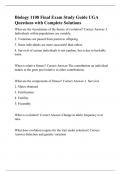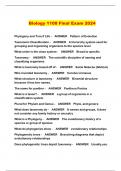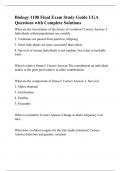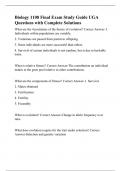Biology 1108 final - Study guides, Class notes & Summaries
Looking for the best study guides, study notes and summaries about Biology 1108 final? On this page you'll find 32 study documents about Biology 1108 final.
All 32 results
Sort by
Biology 1108 final exam (cumulative) Solved 100% Correct!!
Biology 1108 Final Exam Study Guide UGA Questions with Complete Solutions
Biology 1108 Final Exam Study Guide UGA Questions with Complete Solutions

-
Biology 1108 Final Exam Study Guide UGA Questions with Complete Solutions
- Exam (elaborations) • 33 pages • 2024
-
- $14.49
- + learn more
What are the 4 postulates of the theory of evolution? Correct Answer-1. Individuals within populations are variable. 2. Variations are passed from parent to offspring. 3. Some individuals are more successful than others. 4. Survival of certain individuals is not random, but is due to heritable traits. What is relative fitness? Correct Answer-The contribution an individual makes to the gene pool relative to other contributions. What are the components of fitness? Correct Answer-1. Survi...

-
Biology 1108 Final Exam Quiz Questions with 100% pass
- Exam (elaborations) • 15 pages • 2024
- Available in package deal
-
- $12.49
- + learn more
Biology 1108 Final Exam Quiz Questions with 100% pass The term "n" refers to the size of a population, that is, the number of individuals in that population. In general, in a sample of n individuals, the frequency of an allele is: - Correct Answer ️️ -the number of occurrences of the allele divided by twice the number of individuals in the sample (2n) If a population is not in Hardy-Weinberg equilibrium, we can conclude that: - Correct Answer ️️ -evolution has occurred because on...

-
Exam-Biology 1108 Final Exam Study Guide UGA|185 Questions with Solutions (A+)
- Exam (elaborations) • 42 pages • 2024
- Available in package deal
-
- $16.49
- + learn more
Exam-Biology 1108 Final Exam Study Guide UGA|185 Questions with Solutions (A+)

-
Biology 1108 final exam Questions and Answers 100% Pass
- Exam (elaborations) • 11 pages • 2024
-
- $12.49
- + learn more
Biology 1108 final exam Questions and Answers 100% Pass Monophyletic Group - Correct Answer ️️ -includes all the descendants of a common ancestor, and its considered a natural grouping of organisms based on a shared ancestry. Paraphyletic Group - Correct Answer ️️ -some (not all) of descendants of a common ancestor Polyphyletic Group - Correct Answer ️️ -organisms from distinct lineages based on shared characters, but no common ancestor Homologies - Correct Answer ️️ -si...

-
Biology 1108 Final Exam 2024
- Exam (elaborations) • 22 pages • 2024
- Available in package deal
-
- $10.49
- + learn more
Biology 1108 Final Exam 2024...

-
Biology 1108 Final Exam Quiz Questions with 100% pass
- Exam (elaborations) • 15 pages • 2024
- Available in package deal
-
- $12.49
- + learn more
Biology 1108 Final Exam Quiz Questions with 100% pass The term "n" refers to the size of a population, that is, the number of individuals in that population. In general, in a sample of n individuals, the frequency of an allele is: - Correct Answer ️️ -the number of occurrences of the allele divided by twice the number of individuals in the sample (2n) If a population is not in Hardy-Weinberg equilibrium, we can conclude that: - Correct Answer ️️ -evolution has occurred because on...

-
Biology 1108 Final Exam Quiz Questions with 100% pass
- Exam (elaborations) • 15 pages • 2024
-
- $12.49
- + learn more
Biology 1108 Final Exam Quiz Questions with 100% pass The term "n" refers to the size of a population, that is, the number of individuals in that population. In general, in a sample of n individuals, the frequency of an allele is: - Correct Answer ️️ -the number of occurrences of the allele divided by twice the number of individuals in the sample (2n) If a population is not in Hardy-Weinberg equilibrium, we can conclude that: - Correct Answer ️️ -evolution has occurred because on...

Study stress? For sellers on Stuvia, these are actually golden times. KA-CHING! Earn from your study resources too and start uploading now. Discover all about earning on Stuvia





